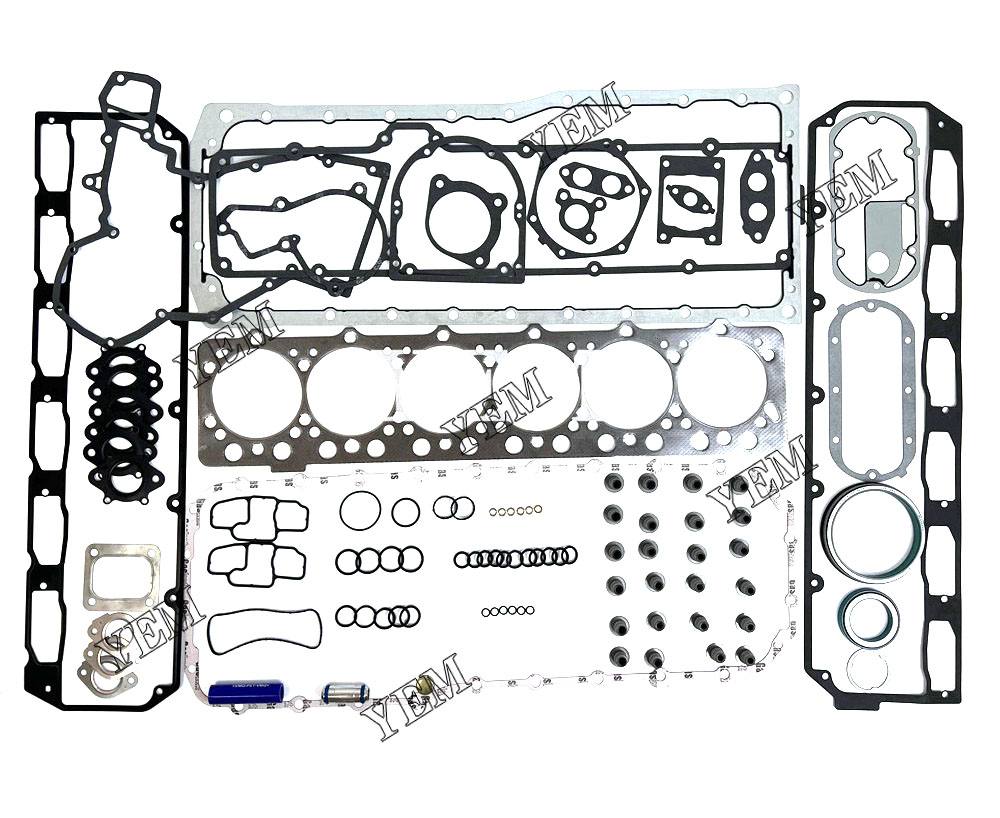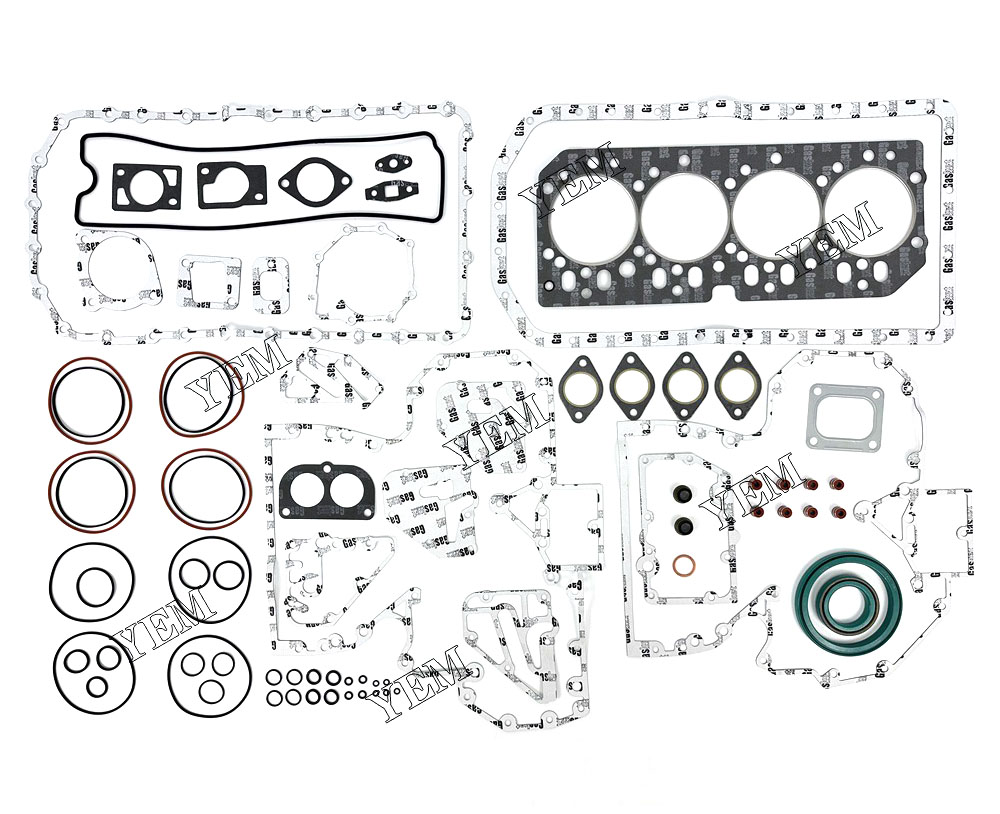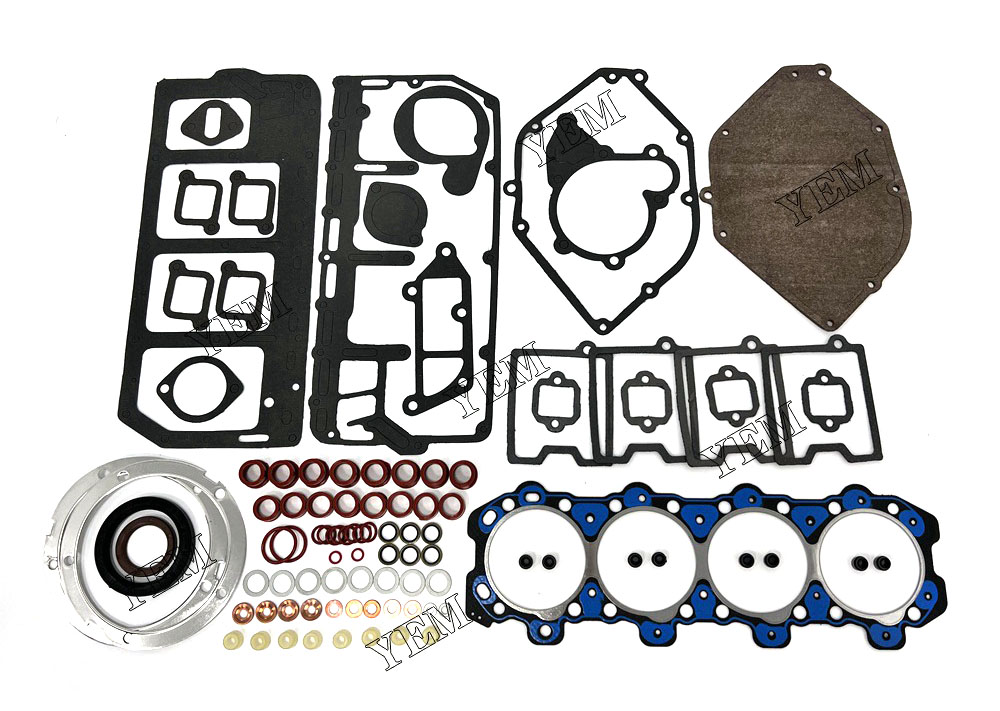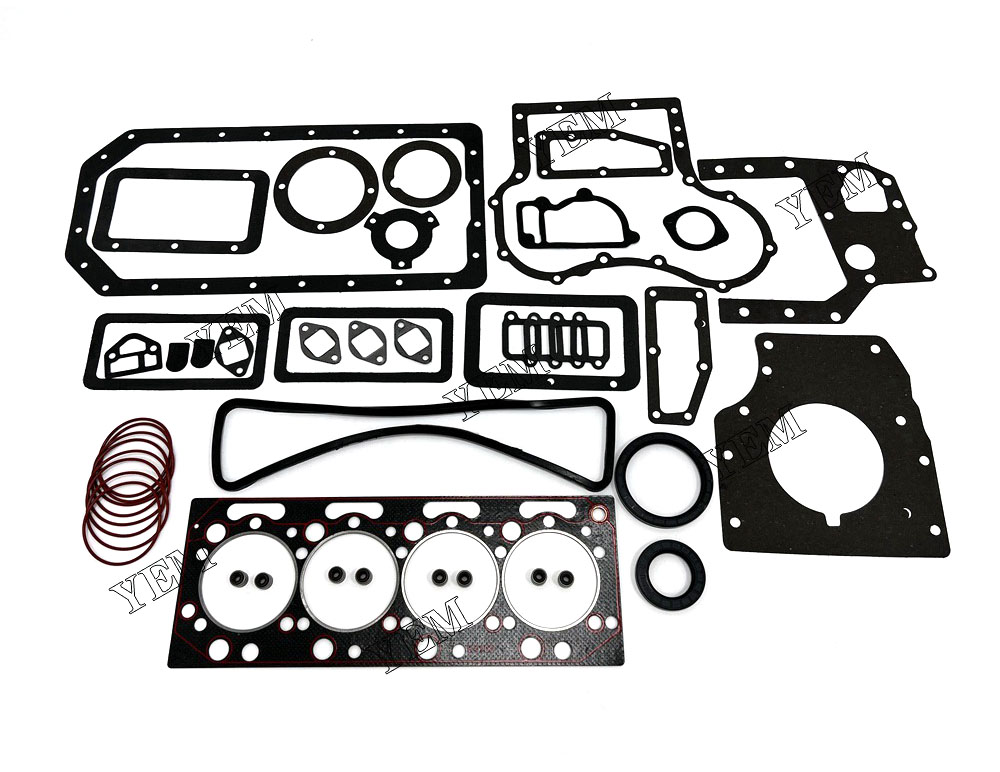A complete engine gasket kit is one of the most vital components during engine maintenance and repair. This article will introduce the components, functions and importance of the full sealing gasket kit to help you understand its role in engine performance and reliability.
What is a full gasket kit
A full gasket kit, also known as a full gasket set, is a package that contains all the necessary gaskets for a particular engine. It includes various types of gaskets that are essential for sealing different engine components and preventing fluid or gas leakage. The gaskets included in a full gasket kit typically cover the cylinder head, intake and exhaust manifolds, valve covers, oil pan, timing cover, water pump, and other components.
The purpose of a full gasket kit is to provide a comprehensive solution for engine sealing during maintenance, repair, or engine rebuilds. It ensures that all the required gaskets are replaced at the same time to create proper sealing and prevent potential leaks or performance issues.
Full gasket kits are often designed to fit specific engine models and come with high-quality gaskets made from materials such as rubber, metal, or composite. These gaskets are engineered to withstand the extreme temperatures, pressures, and chemical exposure commonly found within an engine. By using a full gasket kit, technicians and DIY enthusiasts can simplify the gasket replacement process and ensure the engine’s optimal performance and longevity.
When purchasing a full gasket kit, it’s important to choose the right kit for your specific engine model and application. Popular aftermarket brands and original equipment manufacturers (OEMs) offer a wide range of full gasket kits for various engine types. Prioritize reputable brands known for their quality and compatibility to ensure a proper fit and reliable sealing for your engine.

Full Gasket Kit Features
Full gasket kits typically offer several features designed to provide a comprehensive solution for engine sealing. Here are some common features you can expect to find in a full gasket kit:
- Complete set: A full gasket kit includes all the necessary gaskets required for a particular engine. This includes cylinder head gaskets, intake and exhaust manifold gaskets, valve cover gaskets, oil pan gaskets, timing cover gaskets, water pump gaskets, and more. Having a complete set ensures that all critical gaskets are replaced at the same time for optimal sealing.
- High-quality materials: Full gasket kits are made from high-quality materials that can withstand the demands of the engine environment. These materials may include rubber, metal, or composite gasket materials known for their durability, resistance to heat, pressure, and chemicals.
- Engine-specific design: Full gasket kits are typically designed to fit specific engine models and applications. This ensures that the gaskets have the correct dimensions and specifications for a proper fit and sealing. Engine-specific design also includes features such as specific bolt hole placements, cutouts for coolant passages, and alignment marks, which aid in easier installation.
- OEM or aftermarket options: Full gasket kits are available from both original equipment manufacturers (OEMs) and aftermarket brands. OEM kits are made by the same company that manufactured the engine, providing a direct fit and quality assurance. Aftermarket kits are produced by third-party manufacturers and often provide a cost-effective alternative without compromising on quality.
- Sealing reliability: The primary purpose of a full gasket kit is to ensure proper sealing and prevent fluid or gas leaks. These kits are designed with precision to create a reliable seal between engine components, such as the cylinder head and engine block, valve cover and cylinder head, or oil pan and engine block. This helps maintain engine performance, prevent contamination, and reduce the risk of damage or engine failure.
When considering a full gasket kit, it’s important to research the specific features and compatibility with your engine model to ensure a proper fit and reliable sealing. Reading customer reviews and consulting with automotive experts can also provide insights into the quality and performance of different kit options.

The importance of a full gasket kit
A full gasket kit is essential to the proper functioning of an engine, as it ensures that all the engine components are properly sealed and protected from leaks. Here are some of the key reasons why a full gasket kit is important:
- Prevents fluid and gas leaks: The main function of the gaskets in an engine is to prevent fluid and gas leaks. These leaks can cause serious problems, including engine damage, decreased performance, and safety hazards. By sealing off critical areas of the engine, gaskets prevent leaks and help the engine run smoothly and efficiently.
- Maintains engine pressure: Many areas of an engine require a specific amount of pressure to function properly. If there are leaks in these areas, the pressure can be compromised, leading to poor performance or engine failure. Gaskets help to maintain proper pressure levels by sealing off critical areas of the engine, ensuring optimum engine operation.
- Protects against contamination: Engine components such as the oil, coolant, and fuel systems need to be isolated from each other to prevent contamination. Gaskets help to accomplish this by preventing the mixing of fluids and gases, minimizing the risk of contamination and engine damage.
- Optimizes engine performance: Leaks and other engine problems can lead to decreased engine performance, increased wear and tear, and decreased fuel efficiency. By ensuring proper sealing of all engine components, a full gasket kit helps to optimize engine performance and minimize the risk of costly engine repairs.
- Simplifies maintenance: A full gasket kit provides all the needed gaskets and seals in one package, which simplifies the maintenance process and ensures that all critical gaskets are replaced at the same time. This helps to prevent future leaks and other engine problems, making maintenance easier and more efficient.
Overall, a full gasket kit is critical to maintaining engine efficiency, preventing leaks, and ensuring safe and reliable operation of your vehicle. Therefore it’s important to choose a high-quality kit that is suited to your specific engine model and requirements.
Frequently Asked Questions and Trouble
Sure! Here are some frequently asked questions and common troubleshooting tips related to gaskets:
- How often should gaskets be replaced?
Gaskets generally have a finite lifespan and should be replaced as part of regular maintenance or when signs of damage or leaks are observed. The specific replacement interval can vary depending on the type of gasket and the manufacturer’s recommendations. It’s best to consult your vehicle’s manual or a qualified mechanic for guidance. - What are the signs of a faulty gasket?
Common signs of a faulty gasket include fluid leaks (such as oil, coolant, or fuel), engine overheating, white smoke from the exhaust, loss of engine power, and coolant mixing with oil or vice versa. If you notice any of these signs, it’s recommended to inspect and potentially replace the gasket. - How can I prevent gasket failure or leaks?
To minimize the risk of gasket failure or leaks, regular maintenance is crucial. Ensure that your engine is properly cooled, use high-quality fluids and lubricants, avoid over-tightening bolts and screws during assembly, and follow the manufacturer’s recommended torque specifications. Additionally, avoiding extreme operating conditions and allowing the engine to warm up properly before driving can help prevent gasket damage. - What should I do if a gasket fails or leaks?
If a gasket fails or leaks, it’s important to address the issue promptly to prevent further damage to the engine. Depending on the severity of the leak, you may need to replace the gasket or seek professional help from a qualified mechanic. Continuing to drive with a leaking gasket can lead to more severe engine problems and potential engine failure. - Can I reuse gaskets?
In general, it’s not recommended to reuse gaskets, especially those made of materials like rubber or paper. Gaskets can become compressed or damaged during use, and reusing them may result in leaks or improper sealing. It’s best practice to always replace gaskets with new ones when performing repairs or maintenance.

Remember, if you’re experiencing gasket-related issues or have specific concerns, it’s always best to consult a qualified mechanic or refer to your vehicle’s manual for accurate troubleshooting and guidance.
Maintenance and replacement recommendations
Maintenance and replacement recommendations for various components may vary depending on the specific product, manufacturer guidelines, and usage conditions. Here are some general maintenance and replacement recommendations for commonly used items:
- Filters (air, oil, fuel): Regularly inspect and replace filters as recommended by the manufacturer. This is typically done based on mileage or time intervals, such as every 10,000 miles or every 12 months. Clogged or dirty filters can restrict airflow or contaminate fluids, affecting performance and potentially causing damage.
- Fluids (engine oil, transmission fluid, coolant, brake fluid, etc.): Regularly check fluid levels and change them according to the manufacturer’s specifications. Engine oil is typically changed every 5,000 to 7,500 miles or as recommended by the vehicle manufacturer. Transmission fluid, coolant, and other fluids have varying replacement intervals, which can be found in the owner’s manual. Regularly checking and topping up fluids is also important.
- Belts and hoses: Inspect belts and hoses for signs of wear, cracking, or damage. Replace them if they are worn out or show signs of deterioration. It’s a good practice to have these components inspected during regular maintenance visits or at least once a year.
- Tires: Regularly inspect tire pressure, tread wear, and general condition. Maintain proper tire pressure according to the manufacturer’s recommendations. Rotate and balance tires as recommended (usually every 5,000 to 7,000 miles) to ensure even wear. Replace tires when the tread depth becomes too low or when they show signs of damage.
- Battery: Keep the battery clean and free of corrosion. Regularly inspect and tighten battery connections. Test the battery’s charge and consider replacing it if it’s weak or nearing the end of its expected lifespan (typically 3-5 years).
- Brakes: Inspect brake pads, rotors, and other components regularly. Replace brake pads when they are worn down to a certain thickness (specified by the manufacturer). Ideally, have the brakes inspected during routine maintenance visits or if you notice any signs of brake issues, such as squeaking, grinding, or reduced braking performance.
Remember that these are general recommendations, and it’s essential to consult the specific maintenance schedule and guidelines provided by your vehicle’s manufacturer. Always refer to the owner’s manual or seek advice from a qualified mechanic for accurate maintenance and replacement recommendations tailored to your vehicle.

Full Gasket Kit Brands and Market Selection
When it comes to full gasket kits, there are several reputable brands available on the market. Here are some popular ones:
- Fel-Pro: Fel-Pro is a well-known brand that offers a wide range of gasket kits for various makes and models. They are known for their high-quality materials and precision engineering.
- Victor Reinz: Victor Reinz is another trusted brand that provides full gasket kits for different vehicles. They are known for their durable construction and excellent sealing properties.
- Mahle: Mahle is a global leader in automotive components and offers comprehensive gasket kits for different applications. They are recognized for their superior quality and reliability.
- DNJ: DNJ is a reliable brand that specializes in aftermarket engine components, including gasket kits. They provide budget-friendly options without compromising on quality.
- Fel-Pro PermaTorque: Fel-Pro PermaTorque is a specialized line from Fel-Pro that offers gasket kits with advanced sealing technologies. They are designed to provide long-lasting performance and reliability.
When selecting a brand, consider factors such as the specific requirements of your vehicle, the reputation of the brand, customer reviews, and your budget. It’s also a good idea to consult with a knowledgeable mechanic or automotive professional for their recommendations based on your specific needs.
Summary: Full gasket kits play an important role when maintaining and repairing your engine. Their proper installation and maintenance ensures proper engine operation and extended life. Regular inspection and replacement of full gasket kits is an important part of engine maintenance and cannot be ignored. Choose high quality
Contact us
YEM Professional Excavator Parts Team is a dedicated and experienced team specializing in providing high-quality parts for excavators. With our extensive knowledge and expertise in this field, we offer a comprehensive range of parts to meet the diverse needs of our customers.
Whether you require replacement parts for hydraulic systems, engine components, chassis components, or any other excavator component, the YEM team has got you covered. We source our products from reputable manufacturers and ensure that each part meets the highest standards of quality and durability.
What sets us apart is our commitment to exceptional customer service. We understand the importance of timely support and strive to promptly respond to inquiries and requests. Our knowledgeable staff is readily available to help customers identify the correct parts for their specific excavator model and provide installation and maintenance instructions.
To contact the YEM Specialized Excavator Parts team, you can reach us through our website, email, or phone. We are dedicated to building long-term relationships with our customers and are eager to assist you with all your excavator parts needs.
